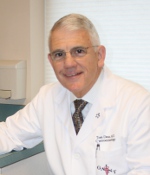 Tom Deas Jr., MD, former Medical Director of Fort Worth Endoscopy Center, an affiliate of Surgical Care Affiliates, and Past President of American Society for Gastrointestinal Endoscopy, talks about the importance of quality reporting in gastroenterology and where trends are headed in the future. Dr. Deas is also one of six members of SCA's Physician Leadership Board.
Tom Deas Jr., MD, former Medical Director of Fort Worth Endoscopy Center, an affiliate of Surgical Care Affiliates, and Past President of American Society for Gastrointestinal Endoscopy, talks about the importance of quality reporting in gastroenterology and where trends are headed in the future. Dr. Deas is also one of six members of SCA's Physician Leadership Board.Sign up for our FREE E-Weekly for more coverage like this sent to your inbox!
Q: What has your group done to begin measuring quality data?
Dr. Tom Deas: We've tracked metrics for colonoscopy for the past few years and just added upper endoscopy to GIQuIC, our quality reporting registry. The ASGE and American College of Gastroenterology developed the GIQuIC registry which creates a database of quality measures, such as adenoma detection, procedure documentation, prep quality, ASA status and other data points that are all automatically uploaded into the registry from our groups ProVation MD software.
Q: How do you use the databases to improve your practice?
TD: The database is for measuring quality. A physician can look at his performance and compare it to all of the physicians participating in the registries. They can find the average rates for the entire participating group, as well as individual practices. If you have 15 to 20 physicians in the group, you can compare your performance to the group and identify good and weak performers and focus on educational efforts for those who aren’t performing well. In many cases it's just knowing there is an issue or problem that leads to the solution.
Q: Do you have any challenges with benchmarking this information? How reliable are these programs?
TD: If you complete the endoscopy reports correctly, the information will be pretty reliable. However, if you don't document correctly and don't indicate polyps are found, the reported data won't be accurate. We've found our system quite reliable and once you are in the habit of getting all information put into the report, it's easy to see the benefits.
We've actually seen a steady improvement by all group physicians in adenoma detection, prep quality and other measures by tracking and benchmarking outcomes. Knowing this information allows you to make changes and become better. It’s not unlike similar practices in athletics. Runners time themselves and want to improve on their personal best. Physicians want to improve in the same way.
Q: How can gastroenterologists tell whether their process improvement makes a difference?
TD: They can continue to benchmark. One example is with adenoma detection rate: there is a broad range of performance levels there. Some physicians have a 45 percent to 50 percent adenoma detection rate (ADR). They have good visualization skills and identify small polyps with a skill set that others don’t have. At the other end of the spectrum, you have physicians that have an ADR of 15 percent . They need to find ways to improve that.
One way to improve adenoma detection is by taking longer to examine the colon, but that doesn’t always solve the problem. Sometimes better bowel preparations are necessary. They can learn better technique by watching other physicians and see how they examine behind folds and are more meticulous in examining the colon mucosa for polyps. You aren’t going to spend time to do that if you don’t have a measure showing you are substandard.
We all want to get better, but we need the feedback that tells us when we need to improve.
Q: What tools exist to help physicians benchmark more effectively?
TD: Collecting data to measure quality is a very tedious process when done manually, so I think there is significant value in registries and endoscopic report writers. ProVation worked with us back in 2008 when we started to work through some of the IT challenges of selecting information and getting it reported correctly. I think going forward we will see an increased focus on measuring quality.
Q: Where do you see GI benchmarking and information gathering headed in the future?
TD: The payment system of the future is moving away from fee-for-service and moving toward a value-based methodology. If a payer is compensating for value, they have to define and measure quality. We are going to develop more advanced and sophisticated ways of doing that, and we are going to rely on information technology to do that. There will be electronic data warehouses combining both clinical and claims information that can be analyzed and studied to measure and assess quality performance.
We need to be able to compare performance against guidelines to see whether physicians followed evidence-based guidelines appropriately. This means the right care at the right time including diagnostic tests and therapies coordinated with other clinicians to achieve optimal results. Because of the complexity of healthcare, performance assessment using clinical information and claims data in an automated process will be less cumbersome than tedious chart review.
Additionally, we will begin to take this same approach for endoscopic procedures. We'll examine the costs to provide various services and benchmark individual performance against others to determine whether we are achieving the highest level of cost efficiency.
More Articles on Gastroenterology:
Valley Gastroenterology of Southwest Virginia Closes, Physicians Relocate
GI Quality Improvement Consortium Adds Upper GI Endoscopy Quality Measures
FDA Panels Will Convene to Weigh Benefit, Safety of CT Colonography Screenings

